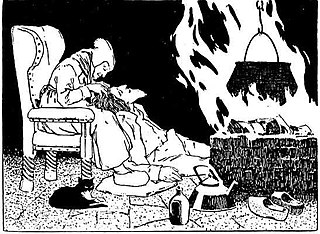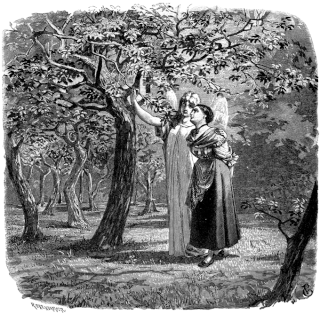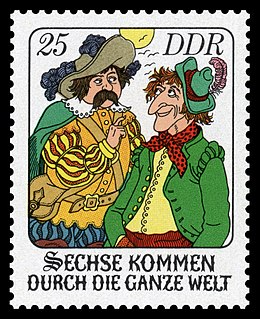Related Research Articles

"The Goose Girl" is a German fairy tale collected by the Brothers Grimm and first published in Grimm's Fairy Tales in 1815. It is of Aarne-Thompson type 533.

King Thrushbeard is a German fairy tale collected by the Brothers Grimm. It is of Aarne–Thompson type 900.

"The Fisherman and His Wife" is a German fairy tale collected by the Brothers Grimm in 1812. The tale is of Aarne–Thompson type 555, about dissatisfaction and greed. It may be classified as an anti-fairy tale.

"The Robber Bridegroom" is a German fairy tale collected by the Brothers Grimm, tale number 40. Joseph Jacobs included a variant, Mr Fox, in English Fairy Tales, but the original provenance is much older; Shakespeare alludes to the Mr. Fox variant in Much Ado About Nothing, Act 1, Scene 1:
Water and Salt is an Italian fairy tale, it can be found in the collection Italian Popular Tales, collected by Thomas Frederick Crane.

"The Devil with the Three Golden Hairs" is a German fairy tale collected by the Brothers Grimm. It falls under Aarne–Thompson classification types 461, and 930.
"The White Bride and the Black One" is a German fairy tale collected by the Brothers Grimm, tale number 135. It is Aarne-Thompson type 403A. Other tales of this type include The Three Little Men in the Wood, Brother and Sister, Bushy Bride, and The Enchanted Wreath.

"The Hut in the Forest" is a German fairy tale collected by the Brothers Grimm. Andrew Lang included it in The Pink Fairy Book (1897). It is Aarne-Thompson type 431.

"The Old Woman in the Wood" is a German fairy tale collected by the Brothers Grimm, tale number 123. It is Aarne-Thompson type 442.
"The Three Little Birds" is a German fairy tale collected by the Brothers Grimm, tale number 96. The story is originally written in Low German. It is Aarne-Thompson type 707, the dancing water, the singing apple, and the speaking bird. The story resembles Ancilotto, King of Provino, by Giovanni Francesco Straparola, and The Sisters Envious of Their Cadette, the story of the 756th night of the Arabian Nights.

"The Girl Without Hands" or "The Handless Maiden" or "The Girl With Silver Hands" or "The Armless Maiden" is a German fairy tale collected by the Brothers Grimm. It is tale number 31 and was first published in the 1812 edition of Children's and Household Tales. The story was revised by the Grimm brothers over the years, and the final version was published in the 7th edition of Children's and Household Tales in 1857. It is Aarne-Thompson type 706.
"Doctor Know-all" is a German fairy tale collected by the Brothers Grimm, tale number 98 in Grimms' Fairy Tales. It is Aarne-Thompson type 1641 about being in the right place at the right time. Another tale of this type is Almondseed and Almondella.
The Three Dogs is a German fairy tale. Andrew Lang included it in The Green Fairy Book, listing his source as the Brothers Grimm. A version of this tale appears in A Book of Dragons by Ruth Manning-Sanders.
"The Three Apprentices" or "The Three Journeymen" is a German fairy tale collected by the Brothers Grimm in Grimm's Fairy Tales as tale number 120.
"The Turnip" is a German fairy tale collected by the Brothers Grimm in Grimm's Fairy Tales.

"Godfather Death" is a German fairy tale collected by the Brothers Grimm and first published in 1812. It is a tale of Aarne-Thompson type 332.

"Clever Hans" is a fairy tale collected by the Brothers Grimm about a boy who ruins his engagement with a girl through a variety of comedic events. The title is claimed by most people to be ironic. It is Aarne-Thompson type 1685 and 1696.

"How Six Made Their Way in the World" is a Grimms' fairy tale about an ex-soldier and his five companions with special abilities who through their feats obtain all of the king's wealth. It is classed as ATU type 513 A, or the "Six Go through the Whole World" type.

"The Grave Mound" is a German fairy tale collected by the Brothers Grimm, KHM 195. It is Aarne-Thompson type 779, Divine Rewards and Punishments.

The Good Bargain is a German fairy tale collected by the Brothers Grimm, KHM 7. This antisemitic fairytale was added to the Grimms' collection Kinder- und Hausmärchen with the second edition of 1819. It is a tale of Aarne–Thompson type 1642. A similar anti-Semitic tale collected by the Grimms' is The Jew Among Thorns.
References
- ↑ Jacob and Wilheim Grimm, Household Tales, "Going a Traveling"
- ↑ D.L. Ashliman, "The Grimm Brothers' Children's and Household Tales (Grimms' Fairy Tales)"